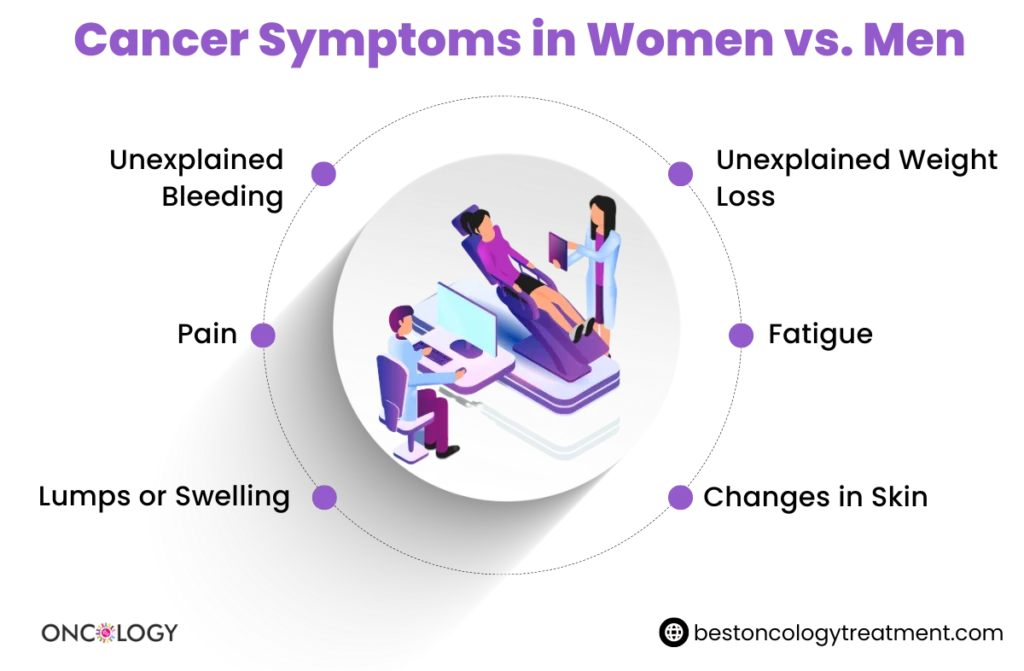Cancer is a global health concern affecting millions each year. Detecting cancer early can dramatically increase the chances of successful treatment and survival. However, the symptoms of cancer can often be subtle, making it vital to recognize early warning signs. In this post, we’ll explore early cancer symptoms, including the 7 warning signs of cancer, and cover essential information for both men and women. By staying informed, you can take proactive steps to protect your health and seek medical attention when needed.
What Are Early Cancer Symptoms?
Cancer symptoms can vary depending on the type and location of cancer, but there are common signs that shouldn’t be ignored. These symptoms are often mild and can be mistaken for less serious conditions, which is why awareness is critical. Understanding these early signs could make a life-saving difference by encouraging timely medical attention.

How Is Cancer Treated?
Treatment depends on the type and stage of cancer. Common options include:
- Surgery: Removal of the tumor and surrounding tissues.
- Chemotherapy: Uses drugs to kill cancer cells or stop their growth.
- Radiation Therapy: High-energy rays target and destroy cancer cells.
- Immunotherapy: Boosts the immune system to fight cancer.
- Targeted Therapy: Focuses on specific genes or proteins involved in cancer growth.
- Hormone Therapy: For cancers like breast and prostate cancer.
For cancers like liver cancer, early signs and symptoms of liver cancer should be addressed with timely medical intervention to explore treatments like surgery or targeted therapy. Advances in treatments also offer hope for managing early stage cancer symptoms effectively.
What Are the Symptoms of Cancer?
Early cancer symptoms vary widely, but here are some common early warning signs of cancer to watch for:
- Unexplained Weight Loss: Losing weight without trying can be an indicator.
- Fatigue: Persistent tiredness that doesn’t improve with rest.
- Pain: Unexplained or persistent pain in specific areas of the body.
- Skin Changes: New moles, changes in existing moles, or unusual skin discoloration.
- Changes in Bowel or Bladder Habits: Diarrhea, constipation, or blood in stool or urine.
- Lumps or Swelling: New lumps in the breast, neck, or other areas.
- Persistent Cough or Hoarseness: Especially if accompanied by blood.
Understanding early stage cancer symptoms is vital for seeking timely medical attention. Early signs and symptoms of liver cancer, for example, include abdominal pain, jaundice, and unexplained weight loss.
Risk Factors
Certain factors increase the likelihood of developing cancer. These include:
- Age: The risk of cancer increases with age.
- Family History: A family history of cancer can raise your risk.
- Smoking and Tobacco Use: Strongly linked to lung, throat, and mouth cancers.
- Diet and Obesity: Poor diet and obesity are linked to several cancers.
- Exposure to Carcinogens: Prolonged exposure to harmful substances.
Recognizing these risk factors can help in taking proactive measures to detect early warning signs of cancer.
Prevention
While not all cancers are preventable, adopting a healthy lifestyle can reduce the risk. Here are some key prevention strategies:
- Avoid Tobacco: Quit smoking and avoid exposure to secondhand smoke.
- Healthy Diet: Eat a balanced diet rich in fruits, vegetables, and whole grains.
- Regular Exercise: Stay physically active to maintain a healthy weight.
- Vaccinations: Protect against viruses like HPV and hepatitis B.
- Regular Screenings: Early detection of early warning signs of cancer improves outcomes.
By focusing on prevention, individuals can lower their chances of experiencing early stage cancer symptoms.
Diagnosis and Tests
Timely diagnosis is crucial for treating cancer effectively. Common tests include:
- Blood Tests: To detect abnormal levels of substances produced by cancer cells.
- Imaging Tests: MRI, CT scans, and ultrasounds help identify tumors.
- Biopsy: A sample of tissue is analyzed to confirm cancer.
- Genetic Testing: Identifies inherited mutations that may increase cancer risk.
For early stage cancer symptoms, regular screening tests like mammograms, colonoscopies, and liver function tests are vital. Early signs and symptoms of liver cancer can be detected through imaging and blood tests, such as alpha-fetoprotein (AFP) levels.
General cancer
Cancer is a complex disease, but the 7 warning signs of cancer offer a simplified guide to symptoms that should prompt immediate medical attention. These warning signs have been widely shared by health organizations to help people recognize when their body might be signaling something serious.
The 7 Warning Signs of Cancer:
- Change in bowel or bladder habits
- A sore that does not heal
- Unusual bleeding or discharge
- Thickening or lump in the breast or elsewhere
- Indigestion or difficulty swallowing
- Obvious change in a wart or mole
- Nagging cough or hoarseness
If you notice any of these symptoms persisting for more than a few weeks, it’s essential to consult a doctor. Although these signs don’t always mean cancer, it’s important to rule out the possibility through medical evaluation.
Early Signs of Cancer in Women
While men and women can experience many of the same early cancer symptoms, certain cancers and symptoms are more prevalent in women. Being familiar with these early signs of cancer in women can help women stay vigilant and prioritize their health.
Specific Early Cancer Signs in Women:
- Breast changes: A lump in the breast, changes in breast shape, or nipple discharge are early signs of breast cancer. Regular self-exams and mammograms are crucial for early detection.
- Abnormal vaginal bleeding: Bleeding between periods or after menopause can indicate uterine or cervical cancer.
- Pelvic pain or bloating: Persistent bloating or pelvic discomfort can be signs of ovarian cancer.
- Unexplained weight changes: Sudden, unexplained weight gain or loss could be an early indicator of ovarian or gastrointestinal cancers.
- Skin changes in the breast area: Redness, dimpling, or peeling of the skin on the breast may signal an underlying cancer.
Women should be proactive about regular screenings, including Pap smears, mammograms, and pelvic exams, to detect cancer at its earliest stages.
Signs You Don’t Have Cancer
One of the common concerns people have is whether their symptoms are related to cancer or another condition. While it’s essential to stay informed about the early signs of cancer, it’s also important to know that many symptoms can have benign explanations. If you’re wondering about signs you don’t have cancer, here are some things to consider.
When It Might Not Be Cancer:
- Temporary symptoms: Many cancer symptoms persist for weeks or months. Short-term symptoms like a two-day headache or brief stomach discomfort are often not cancer-related.
- No systemic symptoms: Cancer often causes symptoms throughout the body, like fatigue or weight loss. If your symptoms are isolated and don’t affect your overall health, they may be due to a less serious condition.
- Improvement with treatment: If your symptoms improve with over-the-counter medications or lifestyle changes, they are less likely to be caused by cancer.
Despite these signs, if you have any concerns, it’s always better to seek medical advice. Regular check-ups and listening to your body are the best strategies to ensure early detection.
Cancer Symptoms in Specific Areas of the Body
Cancer can manifest in various parts of the body, and the symptoms often vary depending on the affected area. Identifying early cancer symptoms is critical for timely diagnosis and treatment. Some of the common regions where cancer symptoms may occur include:
- Lungs: Persistent cough, shortness of breath, and chest pain could signal lung cancer.
- Breasts: Lumps, changes in breast size, or nipple discharge can be early signs of breast cancer.
- Skin: Unexplained moles or sores that don’t heal may indicate skin cancer.
- Digestive system: Persistent abdominal pain, blood in the stool, or difficulty swallowing could be related to gastrointestinal cancers.
For women, it is crucial to recognize early signs of cancer in women such as unusual bleeding or pelvic pain, which may suggest ovarian or cervical cancer.
What Are Cancer Screening Programs?
Cancer screening programs are designed to detect cancer in its early stages before symptoms develop. These programs aim to catch cancer when it is most treatable, thus improving survival rates. Different types of screening programs focus on specific cancers:
- Mammograms for breast cancer
- Pap smears and HPV tests for cervical cancer
- Colonoscopy for colon cancer
- Low-dose CT scans for lung cancer (in high-risk individuals)
Screening is essential for preventing advanced cancer and addressing The 7 Warning Signs of Cancer, such as unexplained weight loss, persistent pain, and chronic fatigue. Regular screenings are especially important for those with a family history or high-risk factors.
Conclusion
Understanding early cancer symptoms and how they may present is the first step toward protecting your health. If you recognize any of these signs in yourself or a loved one, don’t ignore them. Take immediate action by scheduling an appointment with your healthcare provider. Regular screenings and paying attention to changes in your body can make all the difference in early detection and successful treatment.
Read Also: High-Risk HPV Symptoms




